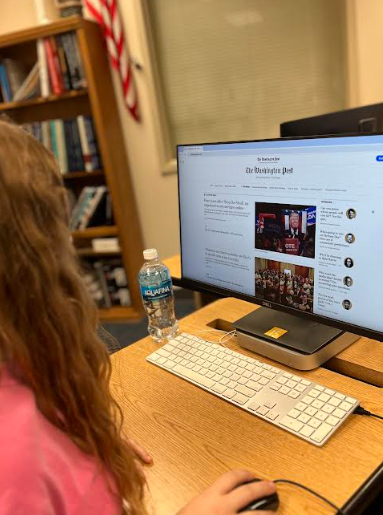
With the upcoming presidential election, American newspapers have started looking into which candidate to endorse. Frequent readers of newspapers such as The New York Times, The Journal Star, and The Washington Post, all await the endorsed candidate to be able to learn more about them and their political campaigns.
For the 2024 election, both The New York Times and The Journal Star endorsed Kamala Harris, while The Washington Post went its separate ways; not for Donald Trump, but unexpectedly, none of the above. For the first time since 1988, The Washington Post skipped a presidential endorsement.
Newspapers often endorse candidates to show participation in American democracy. Discernibly, choosing one candidate over another may be biased, but the real job of the newspaper’s editorial board is to factor in the pros and cons of both presidential candidates and endorse the superlative one—meaning it is chosen by fact, not opinion.
“The newspaper, its staff, and editorial board are maybe the most informed voters in the country—if you are on the editorial board of a newspaper, you’re a very engaged, well-read, and knowledgeable voter,” Andrew Wegley, a state government reporter for The Lincoln Journal Star, said. “It’s an institution taking a stance, but it’s one based on a ton of research and knowledge about different policies and politics behind it.”
When a candidate is endorsed in a newspaper, information about their policies and campaigns are shared, forming what seems like a mini advertisement for the candidate. This is a crucial role the newspaper can play, especially in times where endorsing a candidate can be a way of saving America from a singular existential threat—if there’s candidates running for office that are unfit for the position.
Hence, when The Washington Post announced they weren’t endorsing a candidate for the 2024 presidential election, disagreements and disputes were taking place among readers, workers, political figures, and media commentators. The Post itself lost 250,000 subscribers and many workers on the editorial board.
“I was shocked and disappointed by Jeff Bezos’ decision not to issue endorsements from The Washington Post this year,” Jane Holt, a former journalism teacher and a frequent newspaper reader said. “Newspapers should be places we can turn to for substantive thoughts on the things that affect and surround us.”
Likewise, a journalist has similar opinions.
“It was disappointing,” Wegley said. “It’s a blow to the independence of the editorial section of The Washington Post.”
The suspected reasoning as to why The Post didn’t endorse a candidate was Jeff Bezos’ fear of Trump’s actions.
“It speaks to the fear that Jeff Bezos’ had about Trump—he’s made it pretty clear that he is going to hold grudges if re-elected, and Jeff Bezos’ has companies that have government contracts,” Wegley said. “I hope it’s a one-off and The Washington Post returns to its tradition, because when you have the fear of repercussions dieting the decisions made by newspapers, you’re just on a shaky ground in your democracy.”
While The Washington Post did specify that they won’t be issuing endorsements in future presidential races either, many are still against the decision and protest for endorsements. There may be hope for a decision change in the future, but The Post seems set in stone to neutralize the presidential candidacy in the present.



